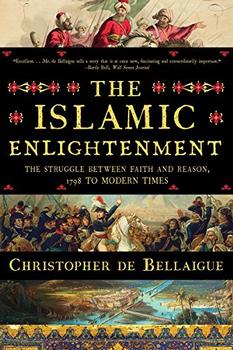Summary | Excerpt | Reviews | Beyond the Book | Readalikes | Genres & Themes | Author Bio

The Struggle Between Faith and Reason, 1798 to Modern Times
by Christopher de Bellaigue
What are we to make of the statement by Zubeyda that her mother had been 'haunted' by the question of the 'equality of the sexes in society and the struggle to achieve it'? In the Turkey of Fatma Aliye's childhood there had been no question of 'equality of the sexes'. There had been no 'struggle'. Now there were both.
We do not have to rely on a novel like Jane Eyre to have an idea of the strides that were made by women in the Western world in the early decades of the nineteenth century. Many history books and biographies have been written about women educating themselves and entering the workplace while a constellation of laws and attitudes changed around them. On the other hand, the story of their later Muslim counterparts – the story of Fatma Aliye, so to speak – is much less known in the West, and this cannot simply be ascribed to the natural inclination of people to interest themselves in stories close to home. Nor does this blind spot in the Western historical understanding relate solely to Muslim women; the West has traditionally refused to see in any aspect of Muslim culture and life the possibility – indeed, the inevitability – of regeneration and modernity. This black spot has existed for hundreds of years, but recently it has got bigger and darker. It dissuades us from trying to understand the past, encouraging us, instead, to go off on tangents, enter blind alleys and credit the claims of demagogues and simplifiers. It is an impediment to a balanced and coherent vision of world history.
In an era when a great many atrocities have been committed in the name of Islam, our ability to appraise Muslim civilisation has been impaired by a historical fallacy propagated by triumphalist Western historians, politicians and commentators, as well as some renegade Muslims who have turned on the religion of their births. These people are united in demanding that the religion of Muhammad re-examine its place and conscience in the modern world. Islam, they say, should subject itself to the same intellectual and social transformations that the West experienced from the fifteenth to the nineteenth centuries, and which laid the foundation for contemporary society. Islam needs its Enlightenment. Islam needs a Reformation, a Renaissance and a sense of humour. Muslims should learn to take insults to their prophet in good part and stop looking at their holy book as the literal word of God – just as many adherents of Christianity and Judaism have done.
The idea behind these counsels is a simple one. Internal deficiencies have barred Islamic civilisation from a number of indispensable rites of passage, without which it will never emerge from its state of backwardness. But these commentaries say more about the people who make them than they do about Islam.
If you think that modern Islamic civilisation has been untouched by reform, it stands to reason that a whole range of characters familiar from your own history will be absent from the pages of the Islamic past: that the world of Islam continues to await its secular philosophers, its feminists, its scientists, its democrats and its revolutionaries. Equally, who can dispute that an Islamic history bereft of intellectual and political reform will inevitably miss out on social and cultural modernity? Politics, education, science, medicine, sex – for more than
1.5 billion Muslims on the earth today (almost a quarter of the world's population) the list of areas that have yet to be smiled on by modernity is literally endless.
It is not necessary to be a specialist of Islamic societies to grasp that this line of thinking leads to a cul-de-sac. It does not escape the attention of inquisitive Westerners who travel to Muslim countries that for the people there the challenge of modernity is the overwhelming fact of their lives. The double imperative of being modern and universal, on the one hand, and adhering to traditional identities of religion, culture and nation, on the other, complicates and enriches everything they do. There is something wonderfully earnest and yet wholly irrelevant about Westerners demanding modernity from people whose lives are drenched in it.
Excerpted from The Islamic Enlightenment by Christopher de Bellaigue. Copyright © 2017 by Christopher de Bellaigue. With permission of the publisher, Liveright Publishing Corporation. All rights reserved.
Your guide toexceptional books
BookBrowse seeks out and recommends the best in contemporary fiction and nonfiction—books that not only engage and entertain but also deepen our understanding of ourselves and the world around us.